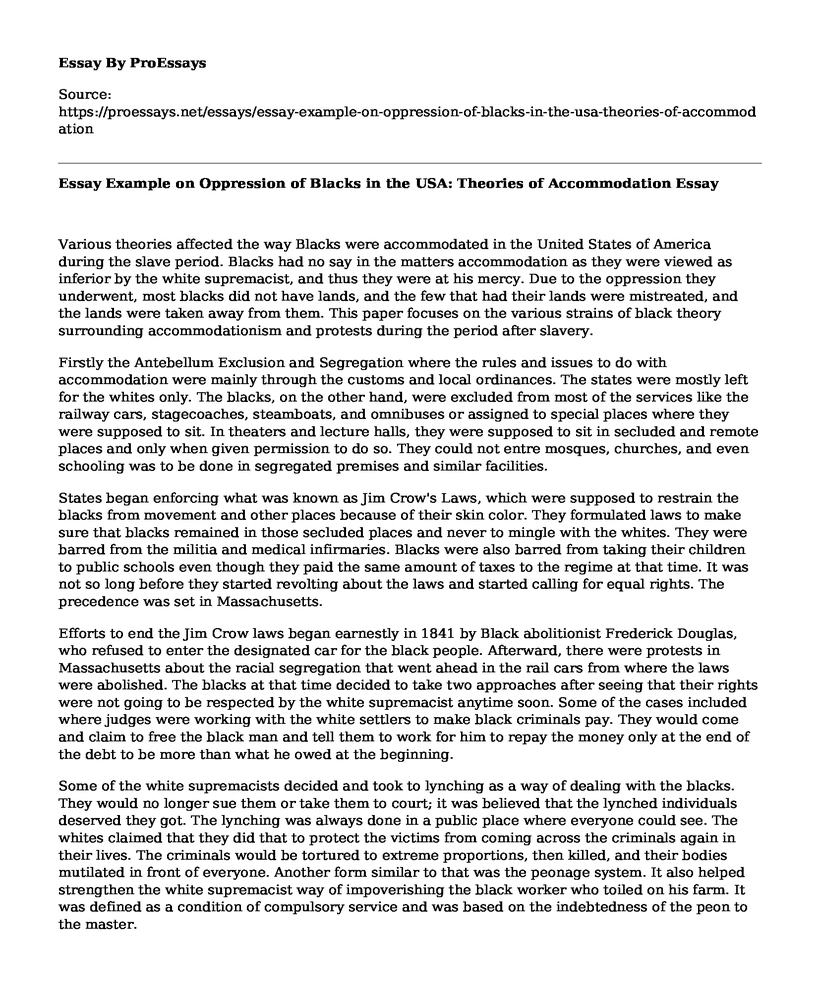Various theories affected the way Blacks were accommodated in the United States of America during the slave period. Blacks had no say in the matters accommodation as they were viewed as inferior by the white supremacist, and thus they were at his mercy. Due to the oppression they underwent, most blacks did not have lands, and the few that had their lands were mistreated, and the lands were taken away from them. This paper focuses on the various strains of black theory surrounding accommodationism and protests during the period after slavery.
Firstly the Antebellum Exclusion and Segregation where the rules and issues to do with accommodation were mainly through the customs and local ordinances. The states were mostly left for the whites only. The blacks, on the other hand, were excluded from most of the services like the railway cars, stagecoaches, steamboats, and omnibuses or assigned to special places where they were supposed to sit. In theaters and lecture halls, they were supposed to sit in secluded and remote places and only when given permission to do so. They could not entre mosques, churches, and even schooling was to be done in segregated premises and similar facilities.
States began enforcing what was known as Jim Crow's Laws, which were supposed to restrain the blacks from movement and other places because of their skin color. They formulated laws to make sure that blacks remained in those secluded places and never to mingle with the whites. They were barred from the militia and medical infirmaries. Blacks were also barred from taking their children to public schools even though they paid the same amount of taxes to the regime at that time. It was not so long before they started revolting about the laws and started calling for equal rights. The precedence was set in Massachusetts.
Efforts to end the Jim Crow laws began earnestly in 1841 by Black abolitionist Frederick Douglas, who refused to enter the designated car for the black people. Afterward, there were protests in Massachusetts about the racial segregation that went ahead in the rail cars from where the laws were abolished. The blacks at that time decided to take two approaches after seeing that their rights were not going to be respected by the white supremacist anytime soon. Some of the cases included where judges were working with the white settlers to make black criminals pay. They would come and claim to free the black man and tell them to work for him to repay the money only at the end of the debt to be more than what he owed at the beginning.
Some of the white supremacists decided and took to lynching as a way of dealing with the blacks. They would no longer sue them or take them to court; it was believed that the lynched individuals deserved they got. The lynching was always done in a public place where everyone could see. The whites claimed that they did that to protect the victims from coming across the criminals again in their lives. The criminals would be tortured to extreme proportions, then killed, and their bodies mutilated in front of everyone. Another form similar to that was the peonage system. It also helped strengthen the white supremacist way of impoverishing the black worker who toiled on his farm. It was defined as a condition of compulsory service and was based on the indebtedness of the peon to the master.
Conclusion
The peonage resulted in the worker signing a contract by his master and failed to fulfill some of the clauses of the contract. They would be indebted to the master and liable for a fine, arrest, and sentenced to prison. The lynching practice and the peonage system made attempts by African Americans to get their freedom very hard.
Cite this page
Essay Example on Oppression of Blacks in the USA: Theories of Accommodation. (2023, Jul 24). Retrieved from https://proessays.net/essays/essay-example-on-oppression-of-blacks-in-the-usa-theories-of-accommodation
If you are the original author of this essay and no longer wish to have it published on the ProEssays website, please click below to request its removal:
- Sociology Essay Example: Children Being Denied a Fair Chance
- Annotated Bibliography on the Impact of Poverty on Educational Outcomes
- Essay on Borderland Issues: Psychoanalysis on TX-MX Border Region
- American Civil War: Abraham Lincoln vs Jefferson Davis - Essay Sample
- Essay Sample on Amazon Withdraws from Chinese Market after 16 Years of Struggle
- Free Essay Example on Community Gardens
- Free Report: Assessing Ram's Eligibility for Canadian Permanent Residence in the Self-Employed Category







